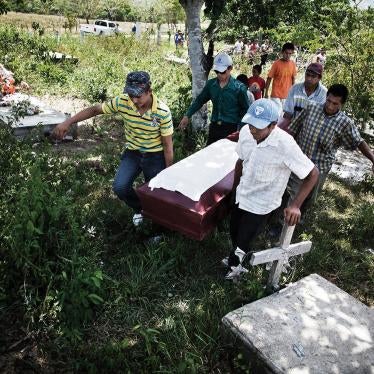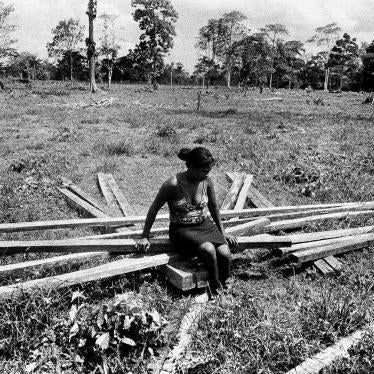(Tegucigalpa) – Honduran authorities have failed to investigate properly a wave of killings and other abuses believed to be tied to land disputes in the Bajo Aguán region, Human Rights Watch said in a report released today.
The 72-page report, “‘There Are No Investigations Here’: Impunity for Killings and Other Abuses in Bajo Aguán, Honduras” examines 29 homicides and two abductions in Bajo Aguán since 2009, as well as human rights violations by soldiers and police. Human Rights Watch found that prosecutors and police consistently failed to carry out prompt and thorough investigations into these crimes, a failure that Honduran public prosecutors, police, and military officials acknowledged in interviews.
“Even in a country afflicted by alarming levels of violence and impunity, the situation in Bajo Aguán stands out,” said Jose Miguel Vivanco, Americas director at Human Rights Watch. “The failure to take rudimentary steps to bring those responsible to justice has helped perpetuate a climate of lawlessness in which more crimes are likely to occur, and has deepened public distrust of the authorities.”
Not one of the 29 homicides documented by Human Rights Watch in Bajo Aguán has led to a conviction, according to information provided by government officials. Only one case went to trial – the November 2010 killing of five campesinos, or small-scale farmers. It was provisionally dismissed in January 2013, pending the discovery of more evidence, after the judge found insufficient grounds to proceed, and has not resumed.
The Bajo Aguán region of northern Honduras has been the setting for long-running, often violent land disputes, many stemming from changes to the country’s agrarian law in 1992. Large tracts of territory in the region have been contested between campesino groups and agro-industrial businesses that mostly cultivate African palm oil. According to a report by the National Human Rights Commissioner of Honduras, 92 people were killed in the land disputes in Bajo Aguán from 2009 to 2012. While the majority of the victims have been campesinos, security guards employed by private firms have also been killed.
In cases in which evidence suggested that soldiers and police in Bajo Aguán committed human rights violations, investigators failed to carry out basic steps to determine whether abuses had occurred, Human Rights Watch found. In cases in which evidence suggested that security forces carried out torture and arbitrary arrests, prosecutors did not examine crime scenes or interview witnesses and suspects. Authorities also delayed searching for missing people who, evidence suggests, were abducted, even when evidence pointed to locations where they might be found. In one of these cases reviewed by Human Rights Watch, the victim was later found dead, while two are still missing.
A lack of transparency on the part of police and prosecutors about the status of pending investigations keeps victims’ families in the dark and undermines confidence in the justice system, Human Rights Watch said. Together with lack of progress on prosecuting suspects for these crimes, these factors create a vicious cycle, discouraging people from coming forward with leads that could help bring those responsible to justice.
In 13 of the 29 killings and an abduction Human Rights Watch investigated, evidence suggests the possible involvement of private security guards. Private guards are subject to national laws on the use of force and are obliged to respect the rights of citizens. Investigations into cases in which victims said private guards were involved were plagued by errors and omissions, such as prosecutors’ failure to requisition work records that would indicate which guards were on duty when a crime occurred.
The alleged involvement of security guards working for agro-industrial businesses in Bajo Aguán in abuses linked to land disputes prompted an investigation by the International Finance Corporation’s (IFC) accountability mechanism – the Compliance Advisor/Ombudsman (CAO) – into the IFC’s lending to Dinant Corporation.
The IFC, the private sector lending arm of the World Bank Group, has rules regarding its clients’ hiring, deployment, and supervision of private security, particularly in the face of credible allegations of abuse. Dinant Corporation told Human Rights Watch it carries out internal investigations into all reports of abuse involving its personnel and cooperates fully with the authorities in relation to any criminal allegations.
The World Bank Group ombudsman’s report, made public in January 2014, found serious problems with how the IFC staff had handled the situation, including underestimating risks related to security and land conflicts, and failing to undertake adequate due diligence even though the situation around the project and the risks had been raised publicly. Nor did IFC project staff inform other IFC specialists on such environmental and social risks about the problems that they knew were occurring, the report concluded. The IFC has publicly acknowledged that there were shortcomings in the IFC’s implementation of its own standards.
The general lack of progress in investigations in Bajo Aguán has exacerbated distrust of the government and fear among the region’s population, particularly among campesino groups.
During his administration, from 2010 to 2013, President Porfirio Lobo made some efforts to mitigate land disputes in Bajo Aguán through mediation and land purchases. But his administration’s predominant strategy for dealing with the violence in the region was to deploy additional security forces and blame criminal groups for the violence – an approach that failed to reduce crime or to improve accountability.
The Lobo administration also failed to take preventive steps to protect people at risk related to land disputes in Bajo Aguán, even in cases in which the evidence suggested violence was likely to occur. In at least two instances since 2010, people were killed who had previously been granted formal “precautionary measures” by the Inter-American Commission on Human Rights for their activities related to Bajo Aguán, which had instructed the Honduran government to provide the individuals with immediate protection. The victims were a journalist and a campesino activist. In a third case, a human rights lawyer was killed who had been promised protection by the Honduran government. None of the three victims were receiving government protection at the time they were killed, Human Rights Watch found.
In other instances of credible threats to communities or individuals, officials have neither investigated nor offered effective protection measures. In several instances in 2013, military officials in the region exacerbated the risk to particular activists working in Bajo Aguán by smearing them and questioning the credibility of their work.
“The new Hernández government has the opportunity to break with its predecessors’ failure to get to the bottom of the killings and abuses in Bajo Aguán,” Vivanco said. “If the administration doesn’t make a serious effort from day one to investigate these crimes, the devastating cycle of violence in the Aguán will persist.”
Human Rights Watch urged Honduran authorities to:
- Set up a special unit with a multi-year mandate composed of prosecutors, police, and investigators to conduct prompt, thorough, and impartial investigations into homicides, abductions, and other serious crimes in Bajo Aguán in which evidence suggests a connection to the land conflict, as well as all cases of alleged human rights violations by authorities in Bajo Aguán.
- Strengthen mechanisms and accompanying legislation to provide timely, effective protection to individuals or groups at risk of violence in the land conflict, particularly human rights defenders, journalists, and members of campesino organizations who have received repeated threats.
- Ensure that private security firms are registered with the government, and that lists of personnel employed and firearms possessed by private security firms are up-to-date, in accordance with national laws.
Examples of cases from the report of flawed investigations into killings, lack of accountability for human rights abuses by government security forces, and inadequate protection measures for those at risk:
- Five members of the Movimiento Campesino del Aguán (Peasant Movement of the Aguán, or MCA) were killed during a confrontation over land at El Tumbador plantation on November 15, 2010. Charges against five private security guards were provisionally dismissed during a trial in which prosecutors failed to collect key evidence, including ballistics tests on weapons allegedly used in the incident and a full inventory of weapons assigned to guards.
- Gregorio Chávez, a farmer and lay preacher, disappeared on July 2, 2012, near his house in the Panamá community. Police did not search a plantation next to his property for days after his disappearance, losing a critical opportunity to collect evidence. When police eventually searched the plantation on July 6, they found Chávez’s body. No one has been charged in the case.
- Santos Bernabé Cruz – then aged 16, and the son of the leader of a campesino group – reported that he was arbitrarily detained by police on September 19, 2011, and accused of participating in an attack that resulted in the death of a policeman, a crime in which he denied taking part. Cruz said that police beat him with helmets, whipped him with a hose, jumped up and down on his body while he was on the ground, then doused him in gasoline and told him they would burn him alive if he did not confess. He said the police held him incommunicado in detention overnight, and then released him the following day without charge. The criminal investigation into the abuses is stalled.
- On September 22, 2012, gunmen ambushed and killed a human rights lawyer, Antonio Trejo, in Tegucigalpa as he stood outside a church. Three days after his death, the minister of justice and human rights acknowledged that Trejo had told the government he feared for his life due to threats, and said the government had provided him with “special security measures.” However, the next day, a spokesman for the Security Ministry said that Trejo had not received any protection through the ministry, as far as he had been able to determine. No one has been charged with Trejo’s killing, which is still under investigation.






